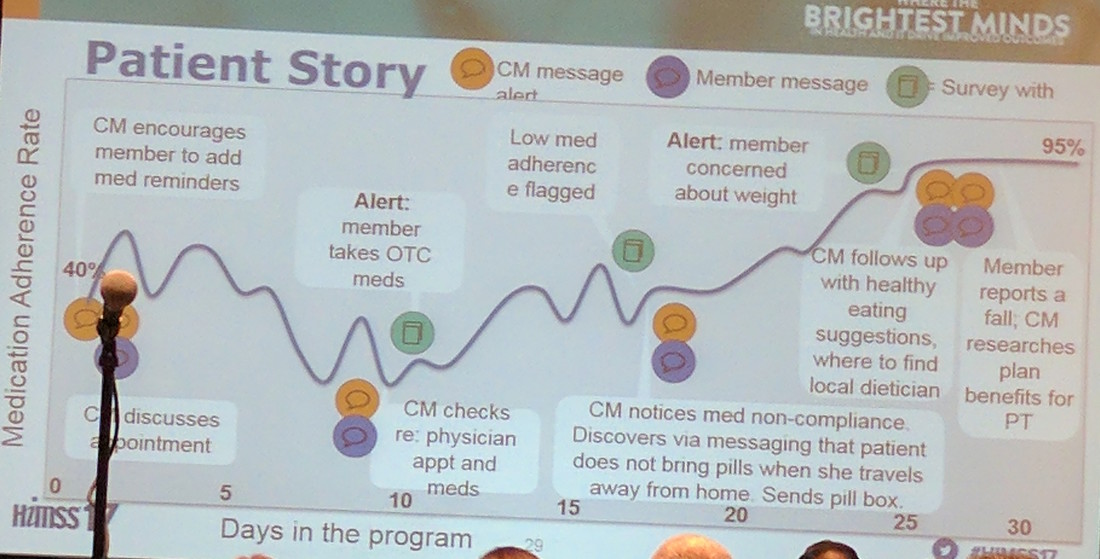|
Coming out of the HIMSS 2017 healthcare IT event in Orlando last week, it is a good time for reflection and to assess areas of focus. Only time will tell if we are at the cusp of a Perfect Storm in healthcare innovation. Here are some soundbites that caught my attention: "increase clinician-patient engagement one minute at a time", "increase joy in clinician days to address surging burnout", "cognitive healthcare era", "augment not replace human intelligence", "most everything patients do is cogent to their self image", "designing for emotional connection not just physical needs", "need dedicated, extensible and agnostic data tier outside EHR", "motivation is desire with velocity" and "health is social". Many key factors are in play that could fuel dramatic change within the industry. We now have access to a wealth of available Technologies in the form of platforms, open source / licensed tools, frameworks, open APIs, growing interoperability, and consumerization has brought modern web, cloud, mobile and device innovation to healthcare. People have accepted that Digital Health innovation is a key pathway to driving lower costs, improving outcomes, quantifying and realizing value based care models, and increasing patient / clinician engagement. As such, Investments are more fluidly being made in Digital Health including with Providers, medical device manufacturers, pharma and other segments of the industry. This is further supported by the strong venture capital/PE, angel and seed startup community, as well as a wealth of startup incubators. At the heart of this new wave of Digital Health innovation is both incremental and dramatic New User Experiences all along the healthcare value chain. New technologies definitely help here, but the big gains come from a streamlined understanding and expression of patient, clinician and other care team member interaction with each other, systems, devices and every meaningful thing at our fingertips from the Internet. An army of UX / UI designers are being employed in this newer generation of products leveraging lean innovation and design thinking concepts vs. the historical ways of bottoms up engineering rollouts or waterfall product development that handicaps many legacy products and systems that fall short on many fronts. With lean innovation comes more experimentation and customer validation to ensure success and participation is high on new offerings. This is key, since Outcomes = Participation * Efficacy. Walking the show floor and attending many of the educational session, there clearly is an abundance of smart and motivated People to drive change if they are empowered within their organization or nimble and sufficiently funded to seize a wide range of external opportunities. There is also no shortage of new healthcare incubators and accelerators that is drawing in young talent with inspiring passions to help improve the world.
It is in this last point where I see people supported by their company as Healthcare Market Makers emerging more over the next couple of years. While there is indeed uncertainty with the newly elected administration in the US (ACA and new policy), regulatory bodies, Payor environment and growing cybersecurity concerns, these all represent changes and opportunities for entry of new solutions. Yes, many large organizations will be slow and resistant to move, but it is these market makers that will define, develop and deploy new innovation starting in small ways that will begin to bear fruit. Others will pay notice and look to replicate, especially with a similar technology and UX underpinning. Market makers (whether it is new tech firms, large incumbents that shift more to play offense, Provider organizations, etc) will 'poster child' their successes for broader realizations. There were some good examples at HIMSS of successes, but more need to be showcased beyond a pilot stage. Additionally these early adopters can't stop where a finite project ends. They must replicate their initial implementations on great scale and impact. An ideal leader in such a market maker company likely has a real strong set of business development and technology innovation skills. Let's stay positive on driving change with what is now before us and think of ways we can become healthcare market makers.
0 Comments
|

 RSS Feed
RSS Feed
